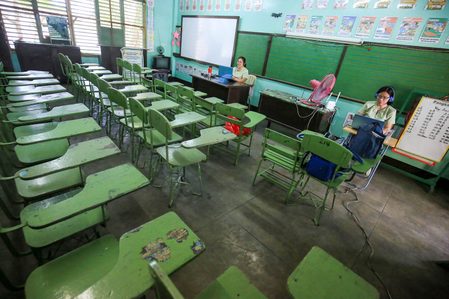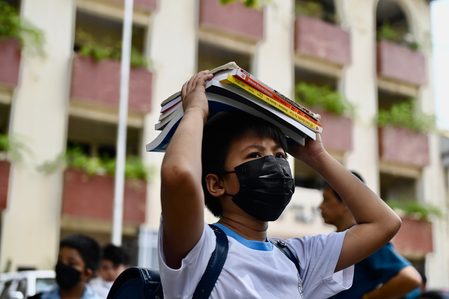SUMMARY
This is AI generated summarization, which may have errors. For context, always refer to the full article.
![[OPINION] Rescuing the education system from the pits](https://www.rappler.com/tachyon/2024/02/tl-deped-rescue.jpg)
Rescuing the education system from the pit into which it has plummeted will doubtless require enabling legislation for curricular reforms, organizational changes, and fresh funds. EDCOM II analysis suggests, however, that the effectiveness of these measures will depend on addressing the persisting problem of misaligned assumptions, objectives, and expectations documented in its report.
The most obvious cases show inconsistency in compliance with the laws or the failure of offices within the same organization to coordinate efforts towards shared objectives. Misalignment occurs at multiple levels of the same institution, but also across independent agencies, among service providers and clients, and between private and public sectors. While it will take more time to distill the essence of the examples in the EDCOM II report, the dots it provides already connect to current concerns.
DepEd, for instance, hopes to get the support of the World Bank to determine “the basis and proper approach for a pay increase” for teachers that would include provisions for higher take-home pay, expanded health coverage, a calamity fund, as well as overload and overtime pay.
A sound suggestion, though hopefully, as recommended, not at the cost of taxpayers. EDCOM II had noted that DepEd’s estimated entry-level hiring cost for statisticians exceeded industry market rates, the kind of miscalculations external vetting would help avoid.
The study should include an analysis of the education market and the comparative performance of service providers. Already, DepEd teachers receive higher pay than their counterparts in the private sector. Is the public getting the expected benefits against actual expenditures, the proverbial bang for their buck? Does DepEd need a monthly entry-level rate of P50,000, the figure floated in media and almost double the current rate, to get effective teachers?
The value of financial incentives to motivate job performance is well-known. But pay increases, especially when distributed across the board to existing personnel, immediately result in a more expensive, not necessarily more effective, staff. If some parochial schools, generally already in distress, provide equal if not better-quality instruction, would it not make sense to transfer to them children out of overburdened public schools, which can then work on improving quality?
Responding to an EDCOM II related concern, DepEd wants to focus on education effectiveness by relieving teachers of non-teaching assignments, such as managing school events or facilities, providing periodic reports to higher authorities, and conducting census or assessment tests. The burden of such obligations and their compensation do not match the prescriptions mandated by the 1966 Magna Carta for Public School Teachers, as EDCOM I already noted in 1994. Additional “ancillary and administrative” duties routinely violate the rules limiting daily teacher working assignment to eight hours, six in the classroom and two for supporting activities.
DepEd’s proposed solution would involve hiring additional people for temporary appointments outside the regular plantilla and paid from the Maintenance and Other Operating Expenses (MOOE) budget. The approach is permitted but problematic. DepEd has identified some 50 extra-curricular obligations imposed on teachers, perhaps not even including all of the activities organized by local government units. Whatever relief the staff will get is likely to be as temporary as the source of funding, a suspicion skeptics within the department have already expressed.
Neither will the measure relieve for long the pressure on DepEd’s budget, the bulk of which supports personnel services. A 2016 World Bank study concluded that “existing levels of school MOOE do not cover the full operating costs of public elementary and high schools.” EDCOM II expects the thrust towards online education to raise the cost of utility bills, already consuming 30-70% of MOOE, leaving little for other learning needs.
The recourse to non-tenured, contractual help for recurring extra-curricular duties funded by MOOE cannot serve as a long-term solution. It is likely instead to feed the natural appetite of bureaucracies to grow. The new recruits become a ready-made lobby group, enlisting populist politicians and paid lawyers to argue that they fulfill necessary services, which entitle them to permanent appointments. As long as the status of regular employees remain secure, they risk little resistance from the established bureaucracy, which gains with growing numbers greater political influence.
Growth can be functional and healthy. But the logic of EDCOM II’s analysis would caution against presuming that the laudable goal of focusing teachers on effective classroom instruction require the expansion of the bureaucracy. A prior step would determine which extra-curricular tasks contribute to DepEd’s mission. Which of the reports filed by teachers are actually read and acted upon and produce meaningful results?
Assessment tests not directly focused on classroom instruction are critical to the collection of comprehensive data for analysis and for maintaining system quality. These often fail because they are poorly planned, inadequately supported, and badly implemented, leading to dubious results made even less useful by delayed completion. Ironically, the sources contributing to failure stem not from lack but from excess of assessment activities of which EDCOM II has enumerated over 30.
A more serious EDCOM II concern, moreover, is the mismatch between the assessment tests conducted and what has emerged as the main problem undermining DepEd’s mission. Evaluation has focused on system assessment, measuring broader educational effectiveness such as might emerge from the comparative performance of organizational units, rather than on tracking the progress of the children in attaining learning competencies. A more deliberate shift to making classroom assessment the priority would also provide a more meaningful evaluation of teaching effectiveness.
The EDCOM II report offers a valuable map for education reform. It deserves diligent study and careful application. – Rappler.com
Edilberto de Jesus is a senior research fellow at the Ateneo School of Government.
1 comment
How does this make you feel?



![[OPINYON] Tungkol sa naging viral na social media conjecture](https://www.rappler.com/tachyon/2024/07/thought-leaders-conjecture-07262024.jpg?resize=257%2C257&crop_strategy=attention)



The closing statement of writer Edilberto de Jesus is highly noted: “The EDCOM II report offers a valuable map for education reform. It deserves diligent study and careful application.” But do we expect a Vice-President working also as DepEd Secretary without experience and the necessary educational qualifications to do the “diligent study and careful application” as required? In addition, she is more focused on spying on Communists in DepEd and the often denied rift between the Marcos-Romualdez and Duterte political dynasties. Anyway, the decision to appoint her to such a position came from President Marcos Jr. himself.